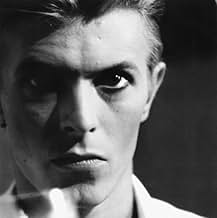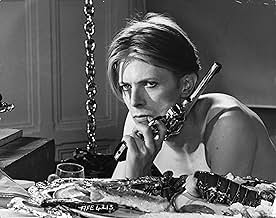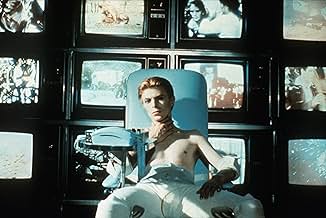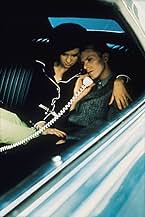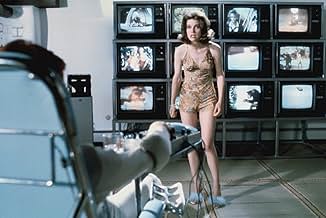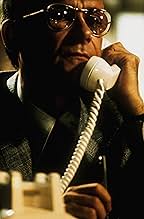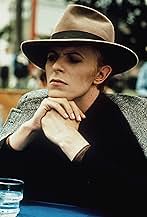Un extraterrestre doit se faire passer pour un humain pour sauver sa planète mourante, mais une femme et la cupidité des autres hommes créent des complications.Un extraterrestre doit se faire passer pour un humain pour sauver sa planète mourante, mais une femme et la cupidité des autres hommes créent des complications.Un extraterrestre doit se faire passer pour un humain pour sauver sa planète mourante, mais une femme et la cupidité des autres hommes créent des complications.
- Réalisation
- Scénario
- Casting principal
- Récompenses
- 1 victoire et 4 nominations au total
Jim Lovell
- Capt. James Lovell, Commander of Apollo 13
- (as Capt. James Lovell)
Dort Clark
- Waiter
- (non crédité)
Avis à la une
I first saw "The Man Who Fell to Earth" when it was first released, and found it to be a jumbled mess. There were plot holes galore, and scenes that went nowhere or had no connection to anything.
A few years back, I saw the director's cut, and it was an entirely different film. The plot holes were filled and all the scenes fit together perfectly. As bad as the original release version was, the director's cut is great and worth seeing.
A few years back, I saw the director's cut, and it was an entirely different film. The plot holes were filled and all the scenes fit together perfectly. As bad as the original release version was, the director's cut is great and worth seeing.
The Man Who Fell To Earth is ultimately a frustrating film. The phrase 'the sum of its parts is greater than the whole' definitely applies. At times it's brilliant and original, but it's effectively brought down by its overlong running time and relentlessly obtuse presentation. It begins very promisingly but falls away in the final third, where it just loses focus and direction. Visually, as can be expected from Nicolas Roeg, it's often quite excellent, with his usual bold editing techniques in place too. The cinematography is very good and David Bowie certainly looks the part. Roeg certainly had a thing for using singers in lead roles. He also utilized Mick Jagger in Performance and Art Garfunkel in Bad Timing, and Bowie like those other two is used to good effect. He doesn't really need to act very much; Bowie in the mid 70's was an almost alien-like creature to begin with. I thought Candy Clark was very good as Mary-Lou. She brought some warmth to the proceedings which was appreciated.
Like Roeg's work in general, there is hardly any humour here. He was primarily a visionary auteur and The Man Who Fell To Earth is undoubtedly a work that allows him to express himself in a highly personal way. But unlike in Performance, Walkabout, Don't Look Now and even Bad Timing the technique never seemed to achieve an overall whole. My feeling is that I would need to re-watch this movie in order to develop a better appreciation of it. On first impressions, it's a collection of great moments within an impenetrable whole. A very strange film though.
Like Roeg's work in general, there is hardly any humour here. He was primarily a visionary auteur and The Man Who Fell To Earth is undoubtedly a work that allows him to express himself in a highly personal way. But unlike in Performance, Walkabout, Don't Look Now and even Bad Timing the technique never seemed to achieve an overall whole. My feeling is that I would need to re-watch this movie in order to develop a better appreciation of it. On first impressions, it's a collection of great moments within an impenetrable whole. A very strange film though.
so, it seems to me there have been a lot of negative reviews. they break down into two categories: 1) those that say its got "too much sex". blah. grow up. 2) those who say "it's a mess". okay...we can work with that.
this really isnt a plot-based scifi like Star Wars. its not about linear events with obvious cause-and-effects, good guys and bad. its part scifi, part art film, and part trippy 70s movie. these movies dont speak with dialogue, they speak with images, and with mood (ie, "How does this sequence make you feel?" warm? uncomfortable? etc) thats just what this movie is. if you dont like these types of movies--movies in which you may have to do some interpretation--you wont like this one either. simple. its not Star Wars, people...Lucas isnt here to hold your hand.
for instance, one of the "gratuitous" sex scenes near the end, after Mary Lou has aged, was not gratuitous but in fact grotesque. it made me uncomfortable. which i am certain is exactly what it was supposed to do--to show me what a sham Newton's relationship with Mary Lou had become. it had become merely a drunken-memory, for them both... and their sex-scene-revisited depicted that, perfectly.
the whole movie is like that, speaking in general feelings and mood rather than black-and-white dialogue. and its more powerful because of it.
so...put it in perspective as you critic it. dont like romantic comedies? then youre not gonna like the latest Hugh Grant film. but that doesnt mean it isnt good. capese? (btw, i think hugh grant movies suck).
this really isnt a plot-based scifi like Star Wars. its not about linear events with obvious cause-and-effects, good guys and bad. its part scifi, part art film, and part trippy 70s movie. these movies dont speak with dialogue, they speak with images, and with mood (ie, "How does this sequence make you feel?" warm? uncomfortable? etc) thats just what this movie is. if you dont like these types of movies--movies in which you may have to do some interpretation--you wont like this one either. simple. its not Star Wars, people...Lucas isnt here to hold your hand.
for instance, one of the "gratuitous" sex scenes near the end, after Mary Lou has aged, was not gratuitous but in fact grotesque. it made me uncomfortable. which i am certain is exactly what it was supposed to do--to show me what a sham Newton's relationship with Mary Lou had become. it had become merely a drunken-memory, for them both... and their sex-scene-revisited depicted that, perfectly.
the whole movie is like that, speaking in general feelings and mood rather than black-and-white dialogue. and its more powerful because of it.
so...put it in perspective as you critic it. dont like romantic comedies? then youre not gonna like the latest Hugh Grant film. but that doesnt mean it isnt good. capese? (btw, i think hugh grant movies suck).
Maybe Starman David Bowie was born to play the title role in The Man Who Fell To Earth, an avant-garde disjointed sci fi film from director Nicolas Roeg.
Thomas Jerome Newton (David Bowie) is an alien who lands in New Mexico with some precious rings, a British passport and some rudimentary knowledge of patents. He needs to make money so he can build a rocket ship that can transport water to his dying planet.
Newton quickly makes money through his advanced business patents, he recruits a chief scientist (Rip Torn) who discovers that he is not what he appears to be and falls in love with hotel maid (Candy Clark) who also introduces him to the delights of gin & tonic.
The government intelligence service and rival businesses decide to look closely into his activities. They throw his patent lawyer and business associate (Buck Henry) out of the window and then hold Newton captive in a hotel plying him with gin.
The film plays with time as years go by and other characters age. We have flashbacks of Newton in his home planet with his family. The most memorable scenes is that of an alien with a British passport and the famous scene of Clark urinating her underwear when Newton reveals himself as an alien.
The film has a cult following but it is not a great film. It is too trippy and unstructured leading you to ask more questions than get any answers from it. Still I cannot think of anyone else who could had played the title role in that era and Bowie goes for it full frontal.
However the combination of Bowie and Roeg makes this a landmark science fiction film of the 1970s just as worthy as Close Encounters of the Third Kind.
Thomas Jerome Newton (David Bowie) is an alien who lands in New Mexico with some precious rings, a British passport and some rudimentary knowledge of patents. He needs to make money so he can build a rocket ship that can transport water to his dying planet.
Newton quickly makes money through his advanced business patents, he recruits a chief scientist (Rip Torn) who discovers that he is not what he appears to be and falls in love with hotel maid (Candy Clark) who also introduces him to the delights of gin & tonic.
The government intelligence service and rival businesses decide to look closely into his activities. They throw his patent lawyer and business associate (Buck Henry) out of the window and then hold Newton captive in a hotel plying him with gin.
The film plays with time as years go by and other characters age. We have flashbacks of Newton in his home planet with his family. The most memorable scenes is that of an alien with a British passport and the famous scene of Clark urinating her underwear when Newton reveals himself as an alien.
The film has a cult following but it is not a great film. It is too trippy and unstructured leading you to ask more questions than get any answers from it. Still I cannot think of anyone else who could had played the title role in that era and Bowie goes for it full frontal.
However the combination of Bowie and Roeg makes this a landmark science fiction film of the 1970s just as worthy as Close Encounters of the Third Kind.
Of all the movies I saw as a teenager (I am now middle aged) this is the one that has remained with me the most, more so even than the highly acclaimed "Deerhunter," which came out 2 years later in 1978. I have not seen it since 1980, so if my memory fails me, please excuse. This eerie, moody movie encapsulated for me -- an alienated kid, I'll grant you -- the perils of living in, and partaking of, the modern world. An alien falls to earth in search of water for his planet, and somehow loses his way, corrupted by materialism, sex, alcohol, the physical world.
I recall Candy Clark's cool, almost southern voice (just saw her in a cameo performance tonight, playing Christopher Walken's girlfriend in the 1986 "At Close Range, another great) purring at Bowie after he has built a little house for her at the end of a dock, "You're such a nice man," and there is something so unsettled about the cinematography -- cloudy and dark and too still -- in the scene that you know he is definitely NOT a nice man, but deeply troubled and unable to respond to human emotions. The other reviewers noted the somewhat disturbing sex scene towards the end of the movie, but for me, at least, that was not needed. I didn't need slime or removed eyeballs (although that is a great scene) to tell me the man is a freak who is human enough to lament his own inability to connect with these creatures from Earth. For the most part the movie was understated, unfolding in its own, detached time.
I recall Candy Clark's cool, almost southern voice (just saw her in a cameo performance tonight, playing Christopher Walken's girlfriend in the 1986 "At Close Range, another great) purring at Bowie after he has built a little house for her at the end of a dock, "You're such a nice man," and there is something so unsettled about the cinematography -- cloudy and dark and too still -- in the scene that you know he is definitely NOT a nice man, but deeply troubled and unable to respond to human emotions. The other reviewers noted the somewhat disturbing sex scene towards the end of the movie, but for me, at least, that was not needed. I didn't need slime or removed eyeballs (although that is a great scene) to tell me the man is a freak who is human enough to lament his own inability to connect with these creatures from Earth. For the most part the movie was understated, unfolding in its own, detached time.
Le saviez-vous
- AnecdotesThe picture was temporarily scored with music from Pink Floyd's album "The Dark Side of the Moon".
- GaffesWhen Mary-Lou takes Thomas to the hotel's fifth floor in the elevator instead of allowing him to use the stairs, she says, "It's five flights." This would be correct in the UK, but not in America; from the ground floor to the fifth floor of an American building is four flights.
- Citations
Thomas Jerome Newton: Ask me...
Nathan Bryce: What?
Thomas Jerome Newton: The question you've been wanting to ask ever since we met.
Nathan Bryce: Are you Lithuanian?
Thomas Jerome Newton: [grins] I come from England.
Nathan Bryce: Ah, that's not so terrible.
- Versions alternativesThe US theatrical release of the film was drastically altered. Not only were 20 minutes cut (including the gun sequence) but some scenes were rearranged and a few scenes had different camera angles.
- ConnexionsEdited into We are the Robots (2010)
Meilleurs choix
Connectez-vous pour évaluer et suivre la liste de favoris afin de recevoir des recommandations personnalisées
- How long is The Man Who Fell to Earth?Alimenté par Alexa
Détails
- Date de sortie
- Pays d’origine
- Langue
- Aussi connu sous le nom de
- El hombre que cayó a la Tierra
- Lieux de tournage
- Sociétés de production
- Voir plus de crédits d'entreprise sur IMDbPro
Box-office
- Budget
- 1 500 000 $US (estimé)
- Montant brut aux États-Unis et au Canada
- 100 072 $US
- Week-end de sortie aux États-Unis et au Canada
- 5 922 $US
- 26 juin 2011
- Montant brut mondial
- 167 072 $US
- Durée2 heures 19 minutes
- Couleur
- Mixage
- Rapport de forme
- 2.35 : 1
Contribuer à cette page
Suggérer une modification ou ajouter du contenu manquant

Lacune principale
By what name was L'homme qui venait d'ailleurs (1976) officially released in India in Hindi?
Répondre


